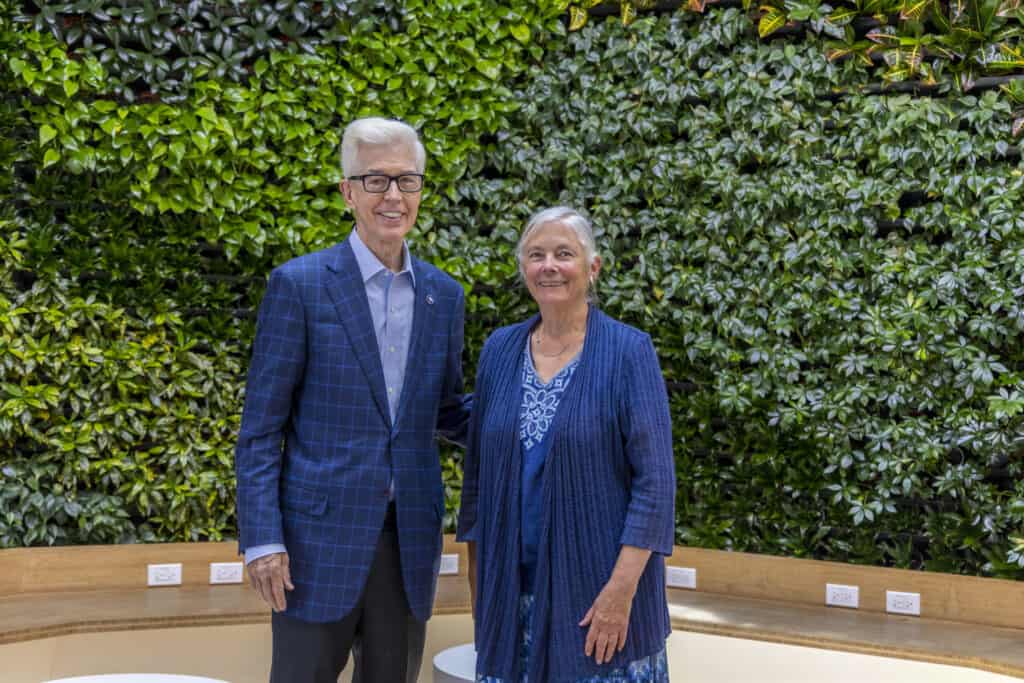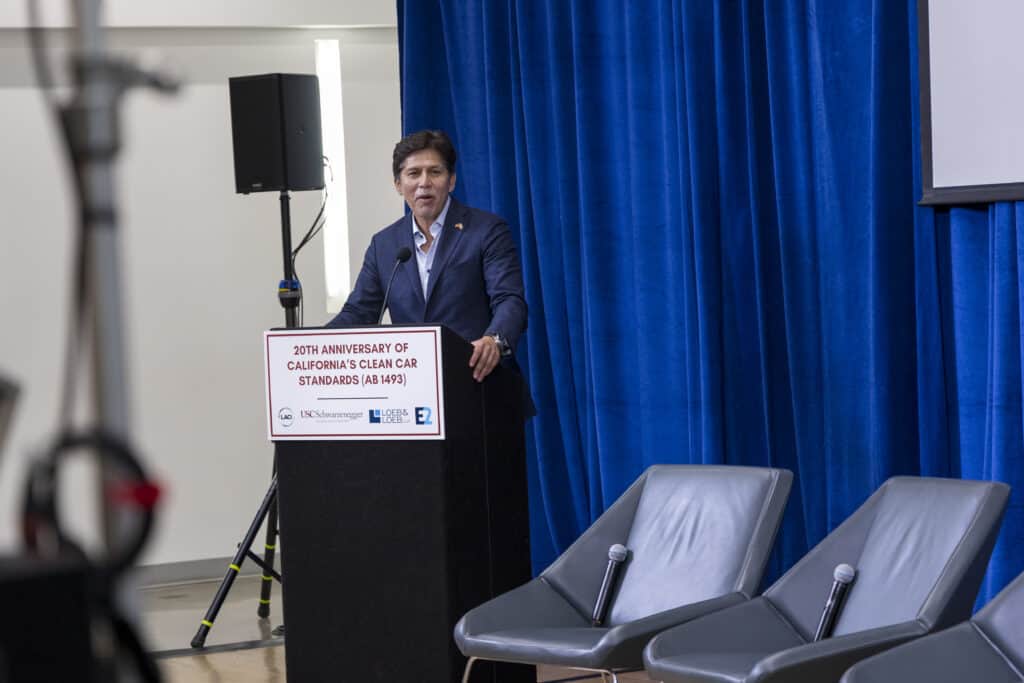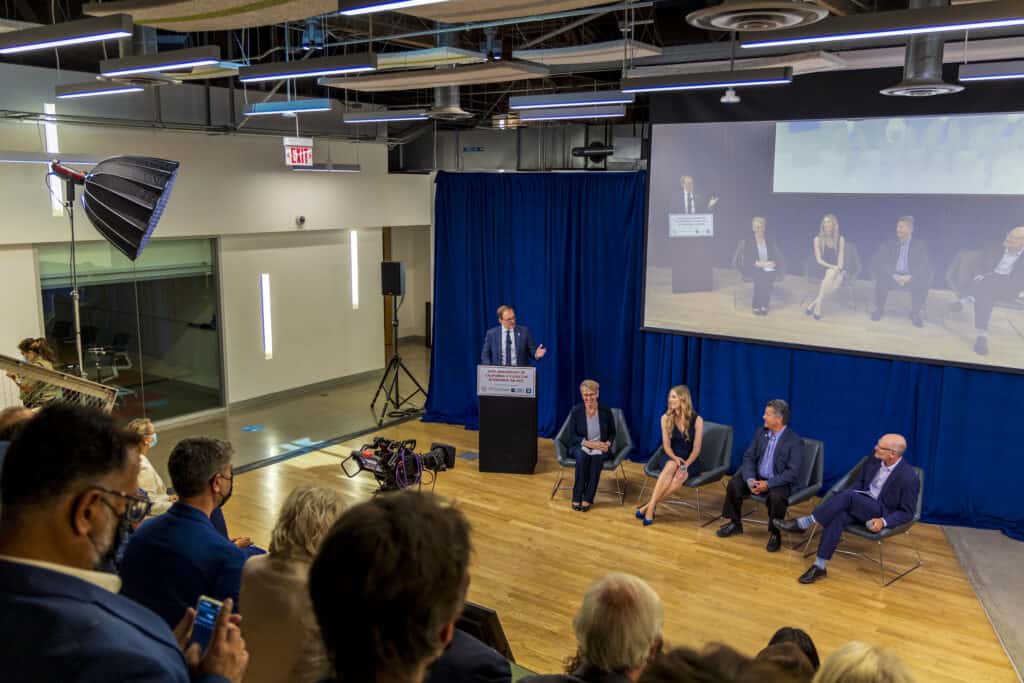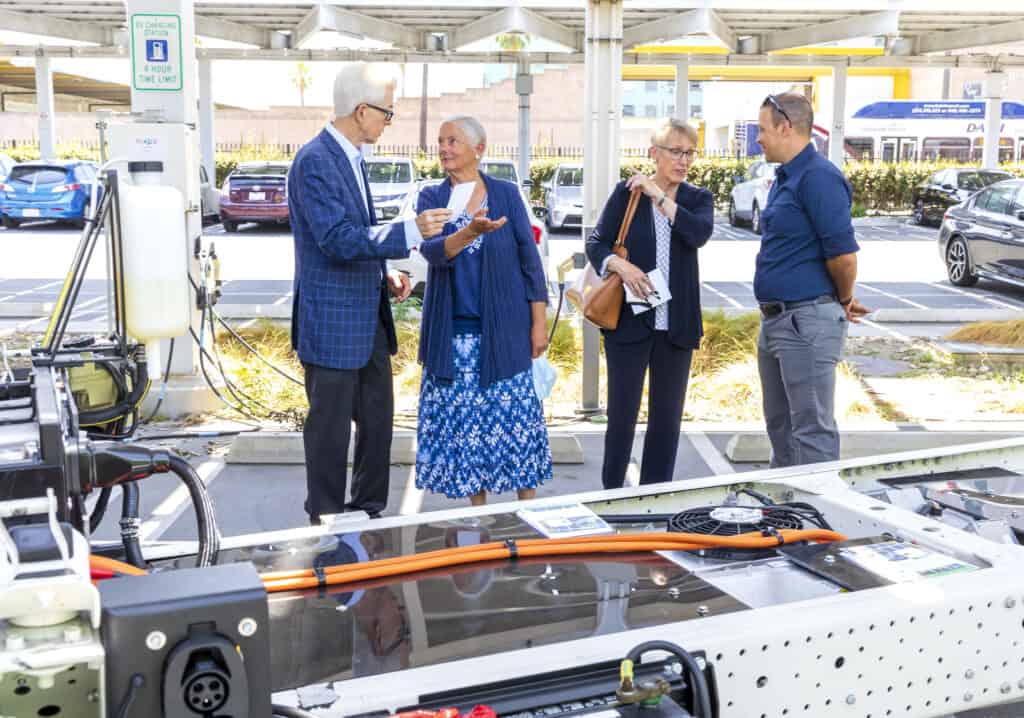By Matthew Kredell
California’s role as a worldwide leader in enacting climate change policy all started on July 22, 2002. That’s when then-Gov. Gray Davis signed into law AB 1493, which established California’s Clean Car Standards.
Many of the architects of California’s AB 1493 gathered at Los Angeles Cleantech Incubator on July 22 to celebrate the 20th anniversary of this landmark legislation.
The USC Schwarzenegger Institute for State and Global Policy co-hosted the event, which recognized then-Gov. Gray Davis and author Fran Pavley for their groundbreaking work to pass the bill.
“I’m very proud that when I came to this fork in the road, I listened to Fran Pavley, Winston Hickox, my whole team, Mary Nichols, and signed this bill,” Davis said. “Because I really do believe it started a clean-energy revolution in America that continues today.”
Pavley gave shoutouts to many people who played instrumental roles in the bill’s passage. These included original sponsors Russell Long from Bluewater Network and Tim Carmichael from the Coalition of Clean Air. They were soon joined by the Natural Resources Defense Council.
Pavley also thanked the following organizations and individuals who made a difference in passing the legislation: Environmental Entrepreneurs (E2), Interfaith Power and Light, Better World Group, Sonoma Climate Center, V. John White, Union of Concerned Scientists, League of Conservation Voters, Environmental Defense Fund, American Lung Association, Sierra Club, the Energy Foundation, as well as many local, state and federal officials.

“It really did take a village,” said Pavley, now environmental policy director for the USC Schwarzenegger Institute. “We could not have been successful without them, many who have joined us today. There weren’t a lot of big organizations in Sacramento supporting this measure. It really was a grassroots effort.”
The legislation mandated that the California Air Resources Board develop and implement greenhouse gas limits for vehicles beginning in model year 2009. It became the first measure passed in the United States to regulate greenhouse gas emissions from passenger vehicles.
A middle school teacher before entering the legislature, Pavley wasn’t heavily influenced by or knowledgeable of the power wielded by oil companies and auto manufacturers that opposed the bill. She just thought it sounded great to clean up the air and greenhouse gas emissions that were contributing to the global climate crisis.
She gave credit to Davis for standing strong against such opposition.
“You want to alienate some of the most powerful special-interest groups in the state, you have to know there could be a price for that,” Pavley said. “And he not only stepped up and signed it but made sure it was implemented. So thank you again, Gray Davis.”
But the story and far-reaching impact of AB 1493 didn’t stop at it becoming law. First it needed to survive seven years of lawsuits from auto manufacturers.
Davis credited the three governors to follow him, Arnold Schwarzenegger, Jerry Brown and Gavin Newsom, with defending and building upon AB 1493.
Pavley followed up her impact with AB 1493 by authoring climate change legislation AB 32, signed by Schwarzenegger, and SB 32, signed by Brown.

“Of all of California’s climate legislation, 1493 is the cornerstone and it was built into everything else that happened afterwards,” Pavley said. “You can’t overestimate how significant it was.”
City of Los Angeles Councilmember Kevin de Leon said Pavley inspired him to continue pushing for legislation to impact climate change during his time in the state legislature.
“I’m not quite sure if I would have moved SB 535 or SB 350 or SB 100 decarbonizing our grid if I didn’t know who Fran Pavley was and was inspired and motivated by Fran Pavley,” de Leon said.
Schwarzenegger was unable to attend due to a filming conflict but provided a letter read by Linda Adams, former California EPA Secretary.
“I’m honored to stand with the many California leaders who have supported this important law and I’m so happy that everyone is gathered today to celebrate the architects of it and our state’s commitment to the environment,” Schwarzenegger wrote. “Gray and Fran, you are both true action heroes who have made California a model for the world.”
Since Davis signed the bill, 17 states have adopted California’s clean car standards as their own. And in 2009, the Obama Administration adopted AB 1493 as the national standard for regulating tailpipe emissions.
“Our bill basically survived all these litigation attacks, if you will, in early 2009,” Davis said. “By then, Obama was President and was well aware of what we were doing. He took most of it, 85 to 90% of it, to form a national solution. Because of these efforts, 1493 not only reduces emissions in California. It reduces them nationally, and we had some impact in people’s thinking around the world.”
The Biden Administration reinstated California’s authority under the Clean Air Act to implement its own leading greenhouse gas emissions standards for cars and light trucks.
“California gives every state a run for their money in terms of climate action, and that’s a good thing,” said Ali Zaida, Deputy National Climate Advisor to President Biden. “That has propelled I think the shift we’re seeing across the country and really a renaissance in the American auto industry.”
Recently, Newsom advanced AB 1493 by announcing that California would become the first state to end new gas car sales by 2035.
“While the Supreme Court is restricting the federal EPA’s ability to tackle climate change, here in California we’re celebrating the 20th anniversary of California’s clean cars rule,” Newsom said in a pre-recorded video. “Our state proudly has been working hard to tackle pollution and clean air for well over a half a century.”
Jason Mark, CEO of the Energy Foundation, moderated a panel discussion on the impact of AB 1493 and the future of mitigating climate change in California with Sandy Berg, vice-chair of the California Air Resources Board, Lauren Faber O’Connor, chief sustainability officer for the City of Los Angeles, and Bob Keefe, executive director of Environmental Entrepreneurs.

(Photo by Deirdre Flanagan) Full set of images of the event are here.
Berg recalled that she joined the California Air Resources Board just 30 days before the vote on 1493.
“One of the premier things that I think 1493 did is it truly was the tipping point for the autos that this was here to stay, that their contribution to health and to climate was absolutely identified, we weren’t going to back down, and they needed to really step up,” Berg said. “We had to fight like hell to get it and we had to wait seven years, and we did not back down.”
O’Connor said that Los Angeles is taking the lessons learned from 1493 and applying them to the heavy-duty sector. In 2017, the ports of Los Angeles and Long Beach committed to zero-emission heavy duty transportation by 2035. Newsom then made it the law of the land for all California ports.
“Cooperation, collaboration and partnership can happen,” O’Connor said. “1493 is an example of something that was generated at the state, has built an incredible, long-lasting coalition, but also wouldn’t have had the full impact that it had if it wasn’t for the Obama Administration. The cooperation and collaboration and learning, that can be something we can apply to the energy sector, to water and so on.”
Keefe literally wrote the book on climate change and the economy. His book Climatenomics: Washington, Wall Street and the Economic Battle to Save Our Planet came out earlier this year.
He attested that AB 1493 changed the narrative regarding environmental policy being bad for business.
“Back then, businesses were almost uniformly against things that were good for the environment,” Keefe said. “Because they bought into the false narrative that so many industries and lobbyists and others were spewing that we couldn’t have a good economy and a good environment. Well, 1493 changed that. Fran Pavley changed that.”
Keefe added that 150,000 people now work in the electric vehicle industry. And when hybrids and other plug-in vehicles are included, that total reaches 250,000 people employed.
“It’s nice to look back and see how much has been done the past 20 years,” Davis said. “But I know this law will continue to affect people for decades to come.”
